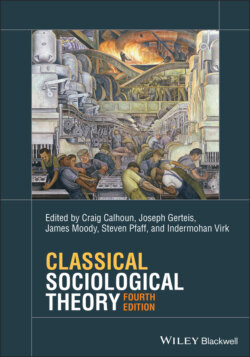Читать книгу Classical Sociological Theory - Группа авторов - Страница 34
Of the first and second Naturall Lawes
ОглавлениеThe right of nature, which Writers commonly call Jus Naturale, is the Liberty each man hath, to use his own power, as he will himselfe, for the preservation of his own Nature; that is to say, of his own Life; and consequently, of doing any thing, which in his own Judgement, and Reason, hee shall conceive to be the aptest means thereunto.
By LIBERTY, is understood, according to the proper signification of the word, the absence of externall Impediments: which Impediments, may oft take away part of a mans power to do what hee would; but cannot hinder him from using the power left him, according as his judgement, and reason shall dictate to him.
A Law of Nature, (Lex Naturalis,) is a Precept, or generall Rule, found out by Reason, by which a man is forbidden to do, that, which is destructive of his life, or taketh away the means of preserving the same; and to omit, that, by which he thinketh it may be best preserved. For though they that speak of this subject, use to confound Jus, and Lex, Right and Law; yet they ought to be distinguished; because Right, consisteth in liberty to do, or to forbeare; Whereas Law, determineth, and bindeth to one of them: so that Law, and Right, differ as much, as Obligation, and Liberty; which in one and the same matter are inconsistent.
And because the condition of Man, (as hath been declared in the precedent Chapter) is a condition of Warre of every one against every one; in which case every one is governed by his own Reason; and there is nothing he can make use of, that may not be a help unto him, in preserving his life against his enemyes; It followeth, that in such a condition, every man has a Right to every thing; even to one anothers body. And therefore, as long as this naturall Right of every man to every thing endureth, there can be no security to any man, (how strong or wise soever he be,) of living out the time, which Nature ordinarily alloweth men to live. And consequently it is a precept, or generall rule of Reason, That every man, ought to endeavour Peace, as farre as he has hope of obtaining it; and when he cannot obtain it, that he may seek, and use, all helps, and advantages of Warre. The first branch of which Rule, containeth the first, and Fundamentall Law of Nature; which is, to seek Peace, and follow it. The Second, the summe of the Right of Nature; which is, By all means we can, to defend our selves.
From this Fundamentall Law of Nature, by which men are commanded to endeavour Peace, is derived this second Law; That a man be willing, when others are so too, as farre-forth, as for Peace, and defence of himselfe he shall think it necessary, to lay down this right to all things; and be contented with so much liberty against other men, as he would allow other men against himselfe. For as long as every man holdeth this Right, of doing any thing he liketh; so long are all men in the condition of Warre. But if other men will not lay down their Right, as well as he; then there is no Reason for any one, to devest himselfe of his: For that were to expose himselfe to Prey, (which no man is bound to) rather than to dispose himselfe to Peace. This is that Law of the Gospell; Whatsoever you require that others should do to you, that do ye to them. And that Law of all men, Quod tibi fieri non vis, alteri ne feceris.
[…]
A Covenant not to defend my selfe from force, by force, is alwayes voyd. For (as I have shewed before) no man can transferre, or lay down his Right to save himselfe from Death, Wounds, and Imprisonment, the avoyding whereof is the onely End of laying down any Right, and therefore the promise of not resisting force, in no Covenant transferreth any right; nor is obliging. For though a man may Covenant thus, Unlesse I do so, or so, kill me; he cannot Covenant thus, Unlesse I do so, or so, I will not resist you, when you come to kill me. For man by nature chooseth the lesser evill, which is danger of death in resisting; rather than the greater, which is certain and present death in not resisting. And this is granted to be true by all men, in that they lead Criminals to Execution, and Prison, with armed men, notwithstanding that such Criminals have consented to the Law, by which they are condemned.
[…]
